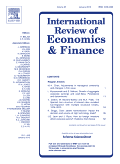
International Review of Economics & Finance
Scope & Guideline
Shaping the Future of Economics and Finance through Quality Research.
Introduction
Aims and Scopes
- Sustainable Finance and Green Innovation:
Research on the intersection of finance and sustainability, including the impact of green finance, corporate social responsibility (CSR), and environmental, social, and governance (ESG) factors on corporate performance and investment strategies. - Digital Finance and Technology:
Exploration of how digital finance, fintech innovations, and blockchain technologies influence traditional financial systems, corporate governance, and economic development. - Economic Policy and Macroeconomic Analysis:
Analysis of the effects of monetary and fiscal policies, economic uncertainties, and global economic conditions on financial markets and corporate behavior. - Corporate Governance and Financial Performance:
Investigation into the relationships between corporate governance structures, managerial decisions, and financial performance metrics, particularly in emerging markets. - Behavioral Finance and Investor Sentiment:
Studies focusing on the psychological factors influencing investor behavior, including how sentiment and social media affect market dynamics. - Regional Economic Development and Trade:
Research on the implications of regional policies, trade agreements, and economic integration on local and international markets.
Trending and Emerging
- Climate Change and Financial Implications:
An increasing number of papers are focusing on the financial implications of climate change, including the impact of environmental policies on corporate performance and investment decisions. - Integration of Fintech in Traditional Finance:
Research on the integration of fintech solutions into traditional financial services is gaining traction, exploring how innovation can enhance efficiency and accessibility in financial markets. - Impact of Geopolitical Risks on Financial Markets:
There is a growing interest in understanding how geopolitical tensions and uncertainties influence market dynamics, investor behavior, and asset prices. - Behavioral Insights in Investment Decisions:
Emerging studies are focusing on behavioral finance, particularly how investor sentiment and psychological factors affect market outcomes, particularly in volatile environments. - Digital Transformation and Corporate Strategy:
Research exploring how digital transformation impacts corporate strategies and operational efficiency is on the rise, particularly in response to the COVID-19 pandemic.
Declining or Waning
- Traditional Economic Theories:
There appears to be a waning interest in classical economic theories that do not incorporate contemporary issues such as sustainability and digital transformation, as researchers increasingly focus on applied and interdisciplinary approaches. - Simple Financial Models without Empirical Validation:
There has been a noticeable decline in papers relying solely on basic financial models without robust empirical analysis, as the journal's audience favors studies that incorporate complex real-world data. - Non-Quantitative Studies:
Research that lacks quantitative analysis or rigorous methodological frameworks is becoming less common, as the journal emphasizes empirical research that provides actionable insights.
Similar Journals
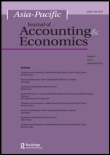
Asia-Pacific Journal of Accounting & Economics
Unveiling the latest trends in accounting and economic research.Asia-Pacific Journal of Accounting & Economics, published by Routledge Journals, Taylor & Francis Ltd, is a prestigious platform dedicated to advancing scholarly research in the fields of accounting, economics, and finance. Established in 2000 and converging its academic rigor through 2024, this journal serves as an essential resource for researchers, professionals, and students seeking to explore the interconnections and complexities within these disciplines. With a notable impact reflected in its Q3 rankings in Accounting, Economics, and Finance, the journal showcases the latest empirical research and theoretical advancements. Although it operates under a traditional access model, its commitment to quality and relevance in the Asia-Pacific region continues to make it a vital publication for those aiming to contribute to the understanding of economic dynamics and financial practices. Researchers and professionals are encouraged to engage with the articles herein to stay abreast of new insights and methodologies shaping the landscape of accounting and economics.
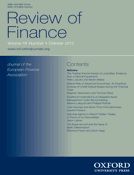
Review of Finance
Pioneering high-quality research in finance and beyond.The Review of Finance, published by Oxford University Press, stands as a premier academic journal in the fields of Finance, Accounting, and Economics. With an ISSN of 1572-3097 and an impressive track record stretching from 2001 to 2024, this journal is consistently recognized for its high-quality research, reflected in its Q1 rankings across key categories, including Accounting, Finance, and Economics and Econometrics. The Review of Finance is dedicated to advancing the understanding of financial phenomena through robust empirical and theoretical insights, making it an essential resource for researchers and professionals alike. Additionally, its strong Scopus rankings, placing it in the top percentiles, highlight its influence and relevance in ongoing academic discourse. Although the journal is not open access, it remains widely accessible through academic institutions, ensuring that its valuable contributions reach an extensive audience. The editorial board invites submissions that promise to further engage the academic community in the dynamic intersections of finance, accounting, and economic research.
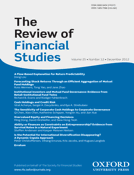
REVIEW OF FINANCIAL STUDIES
Driving Impactful Discoveries in Financial StudiesREVIEW OF FINANCIAL STUDIES, published by Oxford University Press Inc, stands as a premier academic journal in the realms of accounting, economics, and finance. With an impressive Impact Factor that reflects its high citation rates and broad influence, this journal, with an ISSN of 0893-9454 and E-ISSN 1465-7368, is considered a cornerstone for researchers, academics, and professionals seeking to contribute to and stay updated on groundbreaking developments in financial studies. Since its inception in 1996, it has established a robust reputation, consistently ranking in the Q1 category across multiple disciplines, highlighting its elite status in the global academic landscape. The Scopus rankings further reinforce its importance, positioning it at the forefront of business, economics, and finance research. While the journal is not open access, it offers vital insights and comprehensive studies that foster a deeper understanding of contemporary financial issues and methodologies. Located in the United Kingdom, the REVIEW OF FINANCIAL STUDIES is an essential resource for those aiming to advance their knowledge and research in this dynamic field.
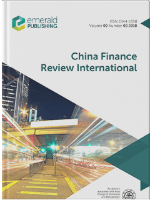
China Finance Review International
Pioneering Discussions on China's Financial EvolutionChina Finance Review International (ISSN: 2044-1398; E-ISSN: 2044-1401) is an esteemed journal published by Emerald Group Publishing Ltd, located in the United Kingdom. With a commendable Q1 ranking in the field of finance according to 2023 category quartiles, this journal has established itself as a leading platform for disseminating significant research in the realms of economics, econometrics, and finance, boasting a remarkable Scopus rank of #13 out of 317, placing it in the 96th percentile. The journal focuses on advancing the discourse surrounding financial issues related to China, making it essential reading for academics, professionals, and students eager to explore the dynamic shifts in this critical area of global finance. As it continues to bridge theoretical insights with practical applications, the China Finance Review International aims to foster a comprehensive understanding of financial mechanisms at play within one of the world's most impactful economies.
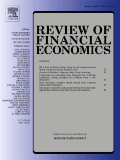
Review of Financial Economics
Exploring Rigorous Research in Financial TheoryReview of Financial Economics, published by WILEY, stands as a prominent peer-reviewed journal in the fields of economics and finance. Established in 1994, this journal provides a platform for rigorous research and thoughtful discourse, contributing to the advancement of knowledge in financial theory and its applications. With an HIndex indicative of its citation impact, it ranks in the Q3 quartile for both Economics and Econometrics, as well as Finance, based on the 2023 categorization, underscoring its role in the academic community. Although it does not currently offer Open Access, the journal remains accessible to a wide audience through institutional subscriptions. Researchers, professionals, and students are encouraged to engage with its insightful articles that address contemporary issues and advancements within financial economics, fostering a deeper understanding of the complex interplay between economic systems and financial markets.

Annals of Economics and Finance
Fostering Critical Discourse in Economics and Finance.Annals of Economics and Finance is an esteemed academic journal published by Wuhan University Journals Press, focusing on the fields of Economics and Finance. Established in 2000, this journal serves as a platform for scholars to disseminate their research findings and insights, contributing to the development of these disciplines through rigorous peer-reviewed articles. Despite currently holding a Q4 ranking in both Economics and Econometrics and Finance categories (2023), it strives to enhance its impact on the academic community and policy-making audiences. While not Open Access, the journal seeks to cultivate a deeper understanding of vital economic theories and financial practices, thereby offering invaluable resources for researchers, professionals, and students alike. With its broad scope, the Annals of Economics and Finance is poised to play a crucial role in shaping contemporary economic discourse up to 2024 and beyond.

Eurasian Business Review
Unveiling Cutting-Edge Research in Business PracticesEurasian Business Review, published by SPRINGER HEIDELBERG, stands out as a premier academic journal in the fields of Business, Management, and Economics. With an ISSN of 1309-4297 and E-ISSN 2147-4281, this journal has established itself as a key resource for researchers and practitioners interested in the dynamics of business practices across Eurasia. It holds an impressive Q1 ranking in both Business, Management and Accounting (miscellaneous) and Economics, Econometrics and Finance (miscellaneous), placing it in the top tier of its field with Scopus rankings of #23/242 and #42/218 respectively. The journal, covering its scope since 2011 and running through to 2024, aims to disseminate cutting-edge research and impactful insights that shape the understanding of economic and business landscapes. While it is currently not an open-access journal, its rich content and rigorous peer-review process guarantee high-quality research publication, making it an essential addition to any academic's library.
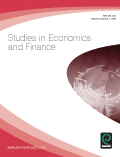
Studies in Economics and Finance
Connecting theory with practice in finance.Studies in Economics and Finance is a distinguished journal published by Emerald Group Publishing Ltd, based in the United Kingdom. With an ISSN of 1086-7376 and an E-ISSN of 1755-6791, this journal has been a significant contributor to the fields of economics, econometrics, and finance since its inception, with coverage ranging from 1977 to the present. Ranked in the second quartile (Q2) for 2023 in its relevant categories, it holds a reputable position within the 83rd percentile in the general economics, econometrics, and finance fields according to Scopus rankings. This journal aims to disseminate cutting-edge research that addresses key issues and emerging trends in the economic and financial landscapes, fostering dialogue among scholars, practitioners, and policymakers. Although it does not operate under an Open Access model, Studies in Economics and Finance continues to be an essential resource for advancing knowledge and providing insights that are crucial for understanding complex economic behaviors and financial systems.

Financial Internet Quarterly
Advancing Knowledge at the Intersection of Finance and TechnologyFinancial Internet Quarterly is an esteemed journal published by WALTER DE GRUYTER GMBH, specializing in the dynamic intersection of finance and digital technology. Since its inception in 2015 as an Open Access journal, it has aimed to disseminate pioneering research, innovative methodologies, and critical analyses pertaining to the financial internet landscape. By addressing contemporary issues in digital finance, cybersecurity, fintech solutions, and blockchain applications, the journal seeks to provide invaluable insights for researchers, policymakers, and practitioners alike. Located in Berlin, Germany, Financial Internet Quarterly fosters collaboration among scholars and industry leaders to advance knowledge in this rapidly evolving field, making it an essential resource for anyone interested in the future of finance.
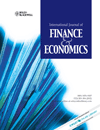
INTERNATIONAL JOURNAL OF FINANCE & ECONOMICS
Unveiling Insights for Financial ExcellenceInternational Journal of Finance & Economics, published by Wiley, is a premier academic journal that serves as a vital resource for researchers and professionals in the fields of finance, accounting, and economics. With an impressive impact factor and a reputation for excellence, the journal is recognized in the 2023 Scopus rankings, placing in the top quartiles across multiple categories, including Q2 in Accounting, Economics, and Finance. The journal has been a significant contributor to academic discourse since its inception in 1996, with its converged years extending to 2024, thereby ensuring the continuous advancement of knowledge in these critical areas. Although it operates under a traditional subscription model, its comprehensive articles provide insightful analyses, empirical research, and theoretical advancements that cater to a diverse audience—from seasoned scholars to emerging students in the field.